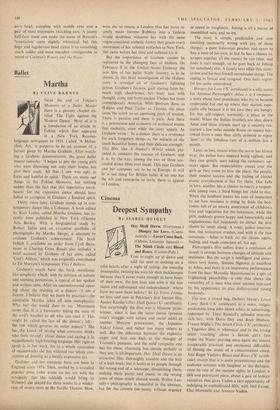Cinema
Deepest Sympathy
By ISABEL QUIGLY Day Shall Dawn. (Everyman.) —Hungry for Love. (Conti- n ent ale.)—Lover Come Back.
(Odeon, Leicester Square).— The Ninth Circle and Blood and Roses. (Cameo-Poly.) Fists brought up at dawn and sold for next to nothing on a cold beach, after a night of toiling; the sneering monopolist, twitting his men for their fecklessness because they'll never make enough to have boats of their own; the lost boat and with it the lost status and self-respect and independence: where have we seen them before? In La Terra Trenta, no less; and now in Pakistan's first feature film, Aaejay Kardar's Day Shall Dawn (`U' certificate). Not surprisingly the 'film was a Moscow prize- winner, since it has the same theme (peasant man's struggle with nature and social odds) as another Moscow prizewinner, the -.Japanese Naked Island, and rather too many others as well. But the difference between the explosive anger and love one feels at the thought of Visconti's peasants, and the mild sympathy one has for these, charming but merely pathetic as they are, is all-important. Day Shall Dawn is an attractive film, thoroughly amiable and the best of a lean week; but it looks at its people through the' wrong end of a telescope, diminishing them, making them pretty and poetic in the wrong sense of those much abused words. Walter Las- sally's photography is beautiful in the abstract, but for the context too posey, without urgency or speed or toughness: fishing is all a matter of moonfilled nets, and so on.
The story is simple, predictable and slow (nothing necessarily wrong with any of those things): a poor fisherman pinches and saves to buy a boat of his own; at last he has a chance to, scrapes together all the money he can raise, and finds it isn't enough, so he goes back to fishing for somebody else. A family love affair (his sister- in-law and his best friend) complicates things. The ending is lyrical and resigned. One feels regret- ful but quite uninvolved.
Hungry for Love (`X' certificate) is a silly name for Antonio Pietrangeli's Adua e le Compagne, a story about four prostitutes who try to become respectable but end up where_they started; espe- cially silly because it is not love they are hungry for but self-respect, normality, a place in the world. When the Italian brothels are shut down Adua and three friends start up a country res- taurant a few miles outside Rome on money bor- rowed from a man they airily promise to repay `later' at the fabulous rate of a million lire a month.
Later, to him, means when the storm has blown over, the police have stopped being vigilant, and they can quietly start taking the customers up- stairs again. But respectability creeps over the girls as they come to love the place, the people, their modest success and the feeling of almost exotic everydayness it has for them, One falls in love, another has a chance to marry a respect- able young man, a third brings her child to stay. When the landlord makes his tour of inspection to see how business is doing he finds the bed- rooms full of an unsexy assortment of children's toys and vegetables for the restaurant, while the girls, suddenly grown happy and housewifely and unglamorous, fail hopelessly to attract the first clients he sends along. A crisis, police interven- tion, the restaurant crashes, and with it the two romances: Adua is back on the streets again, feeling, and made conscious of, her age.
Pietrangeli's film -suffers from a confusion of mood; it swoops between changes of attitude and sentiment. But the script is intelligent and some- times very funny, Simone Signoret is excellent as Adua, and there is an impressive performance from the busy Marcello Mastroianni as a spiv of frightening plausibility—a role that shows the versatility of a man who once seemed type-cast by his appearance to play duffel-coated young husbands.
The rest, a mixed bag. Delbert Mann's Lover Conte Back ('A' certificate) is a noisy, vulgar, predictable long joke about ethics in advertising, redeemed by Tony Randall's splendid neurotic rich boy; with Doris Day and Rock Hudson. France Stiglic's The Ninth Circle ('A' certificate), a Yugoslav film, is whimsical and in the wrong sense 'touching' about a Jewish girl's fate under the Nazis; proving once again the almost insuperable practical and emotional difficulties of filming the inside of a concentration camp. And Roger Vadim's Blood and Roses ('X' certifi- cate), except that it is quite preposterous and the audience screams with laughter at the dialogue, must be one of the nastiest sights in London, a sick and putrescent piece, about a pair of lesbian vampires, that gives Vadim a rare opportunity of indulging in sophiticated filth; with Mel Ferrer, Elsa Martinelli and Annette Vadim.


































 Previous page
Previous page